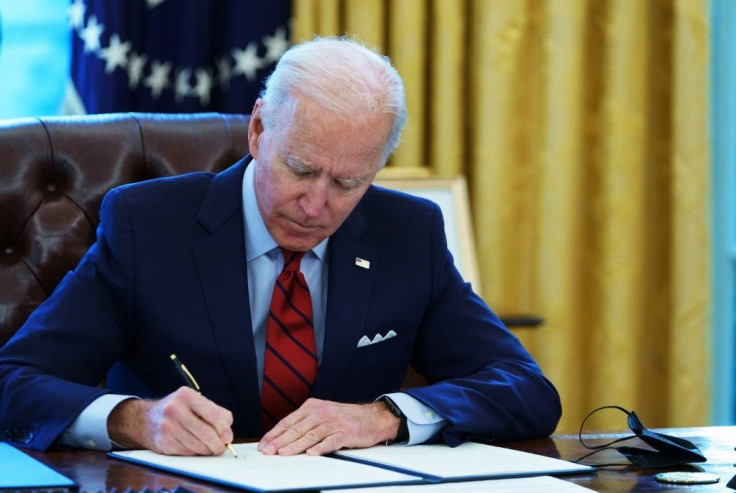
President Joe Biden eliminated expedited asylum screenings during his first month in office to undermine the border policies of the Trump administration, including the construction of a wall with Mexico. He is currently making his version.
Internal government monitoring organizations were extremely critical of Donald Trump's expedited reviews as the number of applicants who passed those "credible fear interviews" fell.
However, the Biden administration has insisted that is quick processing of asylum seekers is unique: Everyone will have access to legal representation during interviews, which will only be conducted by U.S. Citizenship and Immigration Services rather than Border Patrol officers.
The COVID-19 asylum limits are slated to expire on May 11 and the U.S. government is preparing for an anticipated rise in the number of immigrants attempting to cross the border with Mexico when the decision to deploy fast-track screenings is made.
The majority of migrants—roughly three out of four—pass credible fear interviews, but much fewer go on to be granted asylum.
However, over the program's five months under Trump, only 23% succeeded, 69% failed, and 9% withdrew, according to the Government Accountability Office.
Those who pass initial screenings are usually allowed to continue their legal proceedings in immigration court, which typically lasts four years, without restriction. The court backlog, according to critics, encourages more people to apply for asylum.
Migrants must persuade an asylum officer that they have a "significant possibility" of succeeding in court on claims that they will be persecuted in their home countries because of their race, religion, nationality, political opinion, or membership in a social group to pass screenings.
According to the fast-track program under the Biden administration, individuals who don't qualify would be deported "in a matter of days or just a few weeks," according to Homeland Security Secretary Alejandro Mayorkas on Thursday.
Only single adults will be subject to the accelerated screenings, according to Mayorkas.
Even after receiving a briefing from the administration, some immigration groups are skeptical despite the administration's assurances that people will have access to legal services.
Attorneys were informed by advocates that they would not be let inside holding facilities, according to Katherine Hawkins, senior legal analyst at the Project on Government Oversight, AP News reported.
From October 2019 to March 2020, the Trump administration employed fast-track reviews before turning to a public health law known as Title 42 to remove immigrants on the grounds of halting the spread of COVID-19. Biden reversed some of the Trump administration's immigration policies in a February 2021 executive order, including the quick screenings.
The Biden administration won't restrict migrants to just one phone conversation, in contrast to the Trump government.
However, it's unclear how many calls American authorities can handle, particularly if there is no answer and lawyers call back, according to Hawkins.
According to Hawkins and others briefed initial screenings will be restricted to Spanish-speaking nations where the United States regularly flies out deportees.
In Donna, Texas, which is located in the Rio Grande Valley, the administration started with limited screening this month.
Later, it expanded to include large tents in other border cities, such as San Diego, Yuma, Arizona, and El Paso, Texas.
In remarks on Thursday about a broad strategy that, in addition to the screenings, includes processing centers in Guatemala, Colombia, and possibly elsewhere for people to enter the United States legally through an airport, Mayorkas, a former federal prosecutor, avoided going into specifics about access to legal counsel.
According to Mayorkas, "We have expanded our holding capacity and set up equipment and procedures so that individuals have the ability to access counsel."
Under Trump's accelerated screening, the inspector general of the Homeland Security Department objected to the absence of legal counsel.
When screenings started in El Paso, migrants may share four cordless phones. They were taken to a shack by guards to speak with attorneys.
Phone booths were later installed but didn't have handsets for safety reasons, forcing migrants to speak loudly and within earshot of people outside, the inspector general said.
People who have used the facilities say they are more spacious and have many phone booths under Biden.
Paulina Reyes, an attorney with the advocacy group ImmDef, visited a San Diego detention center in March and observed "rows of cubicles, enclosed."
The number of attorneys who have offered to defend asylum seekers has not been disclosed by the administration.
According to Hawkins, officials informed advocates that they are contacting companies that provide free or inexpensive services to persons housed in immigration detention facilities.
Erika Pinheiro, executive director of the Southern California-based and Tijuana-based advocacy group Al Otro Lado, said she hasn't been asked but would decline to represent asylum seekers in accelerated screenings.
They arrive exhausted and unfamiliar with asylum law, which limits their capacity to communicate their stories clearly.
"We know what the conditions are like. We know people are not going to be mentally prepared," she said.
The Biden administration hopes to finish screenings in less than the 72 hours allowed by agency rules, which is the maximum amount of time Border Patrol is supposed to hold migrants.
Currently, a screening takes about four weeks to complete. According to the GAO, 20% of immigrants subject to Trump's quick screenings spent a week or less in detention. Nearly 86% were detained for 20 days or less.
"All hands will be on this deck for the foreseeable future," Knowles said. "We don't know how long."
According to Michael Knowles, president of the American Federation of Government Employees Council 119, which represents asylum officers, U.S. Citizenship and Immigration Services has found 480 former asylum officers or those with training to assist around 800 on the accelerated screenings.
"We know what the conditions are like. We know people are not going to be mentally prepared," she said.
© 2025 Latin Times. All rights reserved. Do not reproduce without permission.




